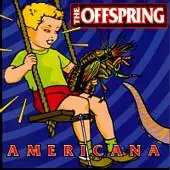Welcome to a look back review of Americana. Please check your assumptions at the pound sign now.
Americana is broadly defined as things associated with the culture of the United States. In the lead up to the release of The Offspring’s fifth album Americana, lead singer and guitarist Dexter Holland was quoted in Billboard stating, "I was thinking about how today’s America is distorted really. It’s not Norman Rockwell anymore; it’s Jerry Springer. It’s not live on the farm; it’s going to Burger King.”
In hindsight, that’s a pretty deft observation and an astute harbinger of the cultural evolution to come in the 21st century. To understand why Americana blew up the way it did, it’s important to understand the context it was released in. The country had just gone through the Gingrich revolution and was entering a time where the dominating topic on the nightly news was what the definition of ‘is’ is. Twenty-four hour news was developing the pornographic and voyeuristic quality it’s perfected today. Daytime TV was dominated by personal dramas as mediated by charismatic, if not problematic, individuals. We were passing laws all around the country implementing harsh sentencing guidelines while kicking millions off public assistance. Generation X was coming into adulthood and the millennial generation’s interests were starting to drive the capitalist machine. Americana captures all of this.
The album is likely most known for its string of hits that kept the band on the charts throughout 1999. Punks be damned, “Pretty Fly (For A White Guy)” saw huge commercial success, and rightfully so. The song’s perfect-to-air-drum-to intro, to its suburban centric video, to its undeniably catchy chorus still hold up. Put the song on at your next party and see for yourself. “The Kids Aren’t All Right” remains one of the best songs of The Offspring’s career. “Why Don’t You Get A Job” has perfect to sing to opening lines, revisited and flipped in the final verse. It’s likely you won’t find a better white dude tinged reggae ode to deadbeat partners. The alternative pop-rock of “She’s Got Issues” follows in the lyrical footsteps of “Self Esteem” if the roles were reversed, both observing a crisis in self-worth.
It’s likely these songs also kept the band relevant for many years to come earning them a new following due to their dominance on MTV and Total Request Live. The videos managed to make rock star status seem attainable to a host of alienated suburbanites while also still appealing to their jock tormentors. It wasn’t stupidly angry or quite as obnoxious as the burgeoning nu-metal scene, nor was it void of any meaning like the incoming boy bands and pop princesses. But it’s not just the singles that make Americana.
The opening one-two punch of “Have You Ever” and “Staring At The Sun” are just as good as the opening salvos on Smash. The double-time signature punk drums of the former wane and crash into a transition of errant cymbal splashes before landing in the groove of the latter. Mid-album cuts “Walla Walla,” “The End Of The Line,” and “No Brakes” are the classic formulation of punk and grunge that The Offspring made a name for themselves on in the local Southern California scene. The songs are replete with enough “whoas” to make them as memorable to the brain as the singles. The diagnosis in “Americana” tells of an instant access culture further casting away anybody who doesn’t fit the American mold. Holland sings, “I’m a product of my environment / So don’t blame me / I just work here / But I want to fuck it up” closing on the observation that his nightmare has come true. The strength of the body of the album gives the band a pass to finish out with “Pay The Man,” a forgettable self-indulgent 8-minute prog influenced closer.
Often overshadowed by Smash, The Offspring’s Americana is a stand out in their discography. Not only did the album capture the zeitgeist of the late 1990s and the burgeoning failures of the white picket fence fantasy, it also contained some of the band’s most recognizable songs partnered with some of the best punk rock they could offer. It netted The Offspring their highest chart position at the time peaking at number 2 on the Billboard 200, a once important marker of success in the bygone area of platinum records for rock bands. It’s hard to imagine that The Offspring are still going, not only 20 years after this release, but 30 years after their inception. Much of that can be credited to the lasting appeal of Americana.
